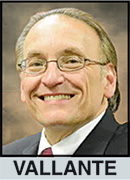OPINION: Healthcare staffing apps: The Challenge of worker classification and Illinois’ solution
 By MICHAEL VALLANTE
By MICHAEL VALLANTE
With the emerging healthcare staffing apps, the state of Illinois recently took a significant step towards defining the rights of nurses and other healthcare workers by amending the Nurse Agency Licensing Act.
The amendment, HB 4666, contains provisions prohibiting nurse staffing agencies from imposing noncompete covenants on nurses and certified nurse assistants. This means these healthcare workers are free to work for other healthcare facilities and agencies without fear of legal action or penalties.
Additionally, HB 4666 also prevents staffing agencies from requiring healthcare workers to pay liquidated damages, conversion fees, employment fees, buy-out fees, placement fees, or any other type of compensation if the worker is hired as a permanent employee of a healthcare facility.
This year, staffing agencies are required to submit quarterly reports to the Illinois Department of Labor that include information about the average amount charged to healthcare facilities for each employee category, the average amount paid by the agency to employees in each employee category, and the average amount of labor-related costs paid by the agency for each employee category, including payroll taxes, workers’ compensation insurance, professional liability insurance, credentialing and testing, and other employee-related costs.
DEMAND FOR HEALTHCARE SERVICES CONTINUES TO GROW
As the demand for healthcare services continues to grow, many healthcare facilities and staffing agencies are turning to apps and other digital platforms to connect with healthcare workers and fill open positions. While these platforms can be effective in bridging the healthcare gap, they also have the potential to create new challenges for workers and employers alike.
One of the biggest challenges of the app-based healthcare staffing model is determining how to classify healthcare workers. Healthcare workers are often classified as independent contractors rather than employees, which means they are not entitled to the same benefits and protections as traditional employees. This can lead to issues around worker misclassification and legal liability, which could have severe consequences for workers and employers.
INCREASED TRANSPARENCY
The Illinois Department of Labor noted that reporting requirements in HB 4666 are designed to increase transparency and accountability in the healthcare staffing industry and to ensure that healthcare workers are being paid fairly and receiving the benefits and protections they are entitled to.
App-based healthcare staffing models are receiving hundreds of millions of dollars in venture capital and expanding rapidly throughout the United States. HB 4666 was seen as a significant victory for healthcare workers in Illinois. With so many other states dealing with their worker misclassification issues, this legislation will be a part of the discussion in other states.
WORKING TOGETHER
In my time with the Small Business Administration, I saw small businesses’ challenges and the threat of liability and lawsuits.
Ultimately, it is in the best interest of healthcare workers, employers, and the legal profession to work together to create a more balanced and equitable system. This can be achieved by establishing clear definitions of worker classifications, increasing transparency and accountability, and ensuring that healthcare workers receive the benefits and protections they need to do their jobs safely and effectively.
If not done right, the worker misclassifications in the healthcare staffing app can create a goldmine of legal cases which will benefit only the legal profession, and could hurt workers, and the agencies that work to fill our critical healthcare facilities.
(Michael Vallante provides consulting and strategic communications services for small businesses and non-profits around the country. From 2017-20, Vallante was the US Small Business Administration’s Associate Administrator for the Office of Field Operations, overseeing the 68 district offices around the country and overseeing the management of SBA’s capital, contracting, and counseling programs serving small businesses.)


Leave a Reply